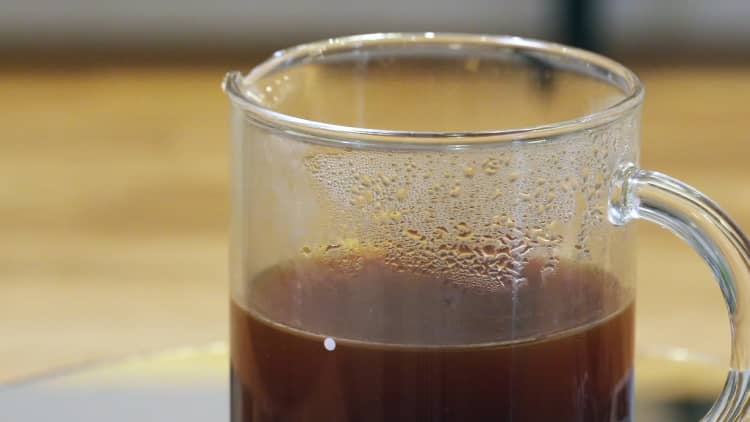If you're like most working Americans, you're probably tired — and you love your coffee.
More than 85 percent of people in the U.S. consume caffeine regularly, with coffee being the the delivery method of choice. And there's a likely reason why — more than 40 percent of Americans don't get enough sleep.
It's no wonder so many people associate mornings with the smell of fresh coffee brewing or a quick trip to Starbucks before work. But according to dietitians and nutritionists, the early morning might not be the best time for your caffeine kick if you want to feel alert throughout the afternoon.

Having your coffee right after waking may cause you to feel jittery and hyper alert soon after drinking it and then very tired a few hours later.
"Definitely limit coffee when you first wake up," Laura Cipullo, registered dietitian and author of "Women's Health Body Clock Diet" tells CNBC Make It.
When you wake up, your body is producing elevated amounts of cortisol, the stress hormone that makes you feel anywhere from alert to anxious. If you add caffeine, which increases levels of cortisol in people who are either mentally stressed or are simply resting, you could have an influx of cortisol at one time.
Some nutritionists say the combination could make you feel more tired later on, when both the caffeine and the cortisol wear off.
The easiest way to feel more awake in the morning is to get more sleep the night before. In addition, however, you might want to try drinking your first cup of coffee slightly later than you normally would.
Consider transitioning to a mid-morning coffee
"Have coffee when the body is producing less cortisol, about three to four hours after waking," Cipullo says.
In other words, if you wake up between 6.a.m. and 8 a.m, have your coffee between 9 a.m. and 11 a.m.
"I would say that mid-morning or early afternoon is probably the best time," certified dietitian-nutritionist Lisa Lisiewski says. "That's when your cortisol levels are at their lowest and you actually benefit from the stimulant itself."
If you need your caffeine in the morning, however, don't suddenly stop consuming it. You wouldn't want to drive while tired, for example. Instead, you could try drinking your coffee later on the weekend or on a day you don't work.
Still, not everyone agrees with the mid-morning theory. Melanie Dellinges, a registered dietitian-nutritionist, says that the amount of caffeine you consume is more important than when you consume it. Depending on your tolerance, you shouldn't have more than two to four cups a day.
Avoid caffeine after 3 p.m.
Dellinges emphasizes a point that's backed by multiple studies: You should never drink coffee in the evening. Caffeine can disrupt your sleep up to six hours after consuming it, leading to an hour or more lost in rest, one study found.
So if you want to start winding down and going to bed at 9 p.m., drinking coffee after 3 p.m. is a bad idea. Some health experts recommend people stop drinking coffee as early as 2 p.m.
If it's the later afternoon or evening and you still need a caffeine boost, try having one cup of black tea, which has half the amount of caffeine of coffee, or green tea, which has around one third the amount.
And don't forget to drink water, which will keep you from feeling sluggish without posing any threats to your nighttime routine.
Like this story? Like CNBC Make It on Facebook.
Check out


